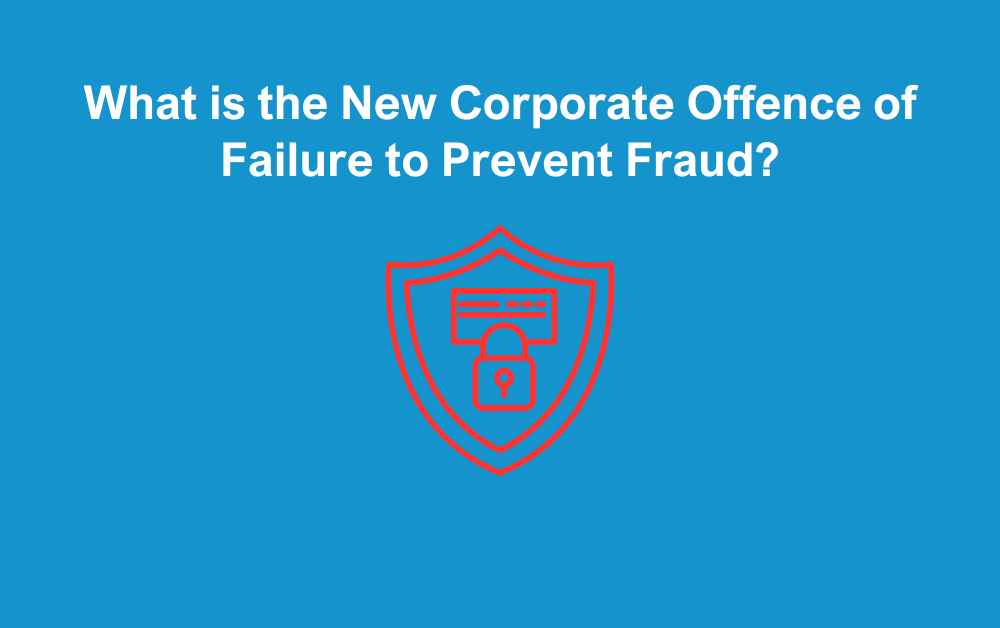Fraud can have a devastating impact on businesses, clients, and the wider public. To tackle this, new legislation is being introduced from 1 September 2025 to make it easier to hold large organisations accountable when fraud is committed on their behalf.
In this article, we will look at what the new corporate offence of failure to prevent fraud is and how employers should prepare.
What is the New Corporate Offence of Failure to Prevent Fraud?
The new offence applies when an employee, agent, subsidiary, or other associated person commits fraud to benefit the organisation or, in some cases, its clients, and the organisation has not put reasonable prevention measures in place. It is not necessary to show that directors or senior managers knew about or approved the fraud.
The offence sits alongside existing laws, so the individual can still be prosecuted for the fraud itself, while the organisation can be prosecuted for failing to prevent it. The aim is to strengthen accountability, encourage robust fraud prevention procedures, and promote a culture of integrity within large organisations.
Which organisations fall within the scope of the offence?
The offence applies to large corporations who have two or three out of the following criteria:
- more than 250 employees;
- Above £18 million in total assets.
- more than £36 million turnover
These conditions are based on the organisation’s financial year immediately before the year in which the fraud took place. This applies to the whole organisation which includes subsidiaries no matter where the organisation is headquartered or where the subsidiaries are based. You can find out more organisation criteria on the Government guide.
What Reasonable Measures are Required?
To avoid any legal issues in the future, you must clearly show you have put preventative measures in place. This includes:
- anti-fraud training;
- Investigate into suspected fraud
- maintaining effective whistleblowing procedures;
- risk assessments
- Upholding a company culture that deters fraud and encourages employees to raise concerns;
- ongoing vetting and pre-employment checks;
- including fraud messaging into existing policies and procedures;
- Monitoring and review
According the the Government guide, these measures will be outcome-focussed and flexible, taking in to consideration the variety of circumstances that organisations find themselves in. However, procedures put in place to prevent fraud should be proportionate to the risk.
Consequences of Non-Compliance
Even if senior management were unaware of the fraud, the organisation can still be prosecuted if it has failed to put reasonable preventative measures in place (as outlined above). If found guilty, the business could face an unlimited financial penalty, which may have a significant impact on its operations and financial stability.
Beyond the legal and financial consequences, the damage to an organisation’s reputation can be severe. Loss of client trust, negative media coverage, and harm to stakeholder relationships can have long-lasting effects, making it harder to win new business or retain existing contracts. In some cases, reputational damage can be more costly than the fine itself.
How HR Can Support Fraud Prevention
HR plays a crucial role in helping organisations meet their legal obligations and reduce the risk of fraud. From implementing clear policies to embedding a culture of integrity, effective HR practices can make all the difference. HR teams can:
-
Develop and deliver anti-fraud training for employees at all levels
-
Ensure thorough pre-employment checks and ongoing vetting processes
-
Support whistleblowing procedures and ensure employees feel safe raising concerns
-
Embed fraud awareness and prevention messages into policies, onboarding, and performance processes
-
Help managers carry out fair and thorough investigations into suspected fraud
-
Promote consistent communication that reinforces ethical behaviour and organisational values
At The HR Booth, we work closely with employers to put these measures in place. We can help you design proportionate, practical policies, deliver training that engages employees, and support you in building a culture that actively deters fraud. Our team can also review your current procedures to ensure they meet the requirements of the new legislation, giving you confidence and compliance.
Contact Us
The 1st September is just around the corner. Therefore, preparing for the new offence of failure to prevent fraud starts now. Whether you need help reviewing your HR policies, delivering training, or ensuring your processes are compliant, we’re here to support you.
Call us on 01383 668 178, email advice@thehrbooth.co.uk, or fill out the contact form below to arrange a chat with our team.







